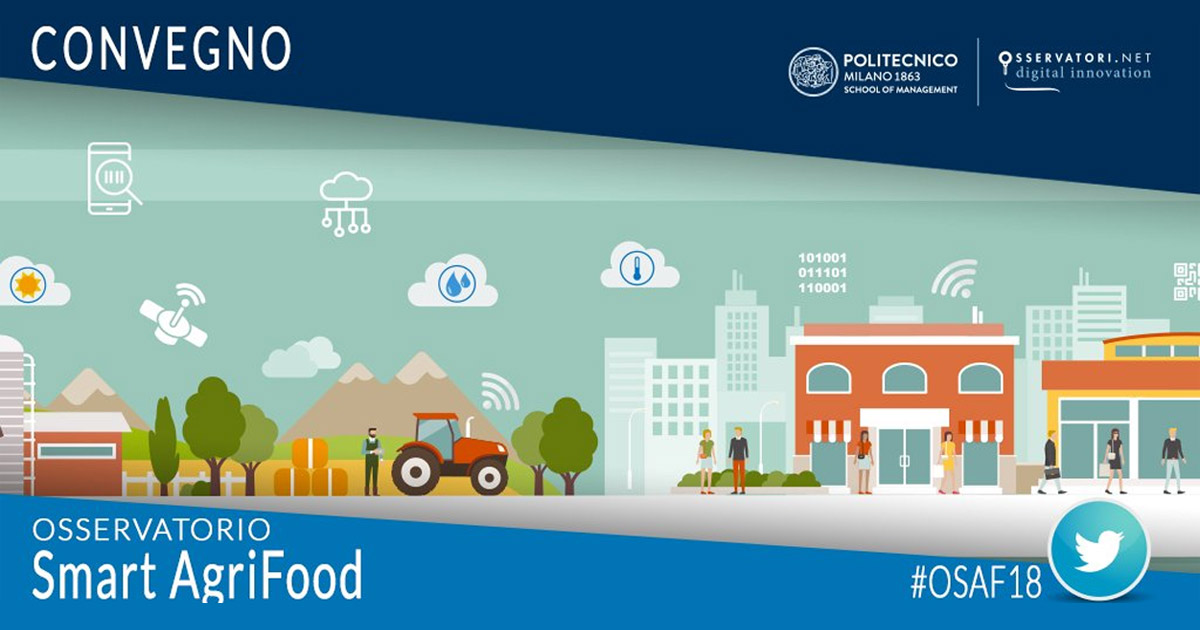May 30, 2020
Presentation of the research results of Observatory on Smart AgriFood
On Wednesday 24 January, Wenda has participated as speaker in the presentation of the results of the research Sow data. Reap value. The Agrifood digital transformation by Observatory on Smart AgriFood, realised by the School of Management from Politecnico di Milano together with RISE Laboratory (Research and Innovation for Smart Enterprises) from the University of Brescia. According to FAO-OECD estimates, the world’s food requirements will considerably increase within 2050 (from 59% to 98%), and such growth will not be able to be sustained through the mere expansion of cultivated land – on grounds of environmental, social and economic unsustainability – but by means of several innovations, large part of which will be generated and supported by the ongoing digital transformation. Moreover, the population able to afford a more comfortable lifestyle, oriented towards the paradigm of Food Safety, and inclined to purchase quality and traceable products is growing. The Italian agrifood system can contribute to satisfy this demand and to the global food challenges thanks to quality products and the optimisation of processes that can be secured by the digital evolution of supply-chains. The digital innovation in the agrifood productive system (or Smart AgriFood) is a relatively new process in Italy and presents significant growth perspectives. The research focused mainly on three aspects: Agriculture 4.0, innovations in food quality and sustainability, innovative push that digital startups are bringing in this sector.
Interconnected agriculture, defined Internet of Farming, added to Precision Agriculture and to the use of innovative technologies in the supply-chain (particularly in the distribution chain), constitutes the paradigm of Agriculture 4.0, that is the harmonious use of different technologies aiming at the the improvement of crops yield and sustainability, productive and processing quality, traceability and work conditions. The importance of data and the technologies used to gather and elaborate them suggest that the next step will be about valorising them inside agribusinesses and supply-chains, through integrated platforms. The true value of Agriculture 4.0 can be grasped by harnessing these data across supply-chains: it is possible to map out and certify products from the field to the processing industry, constitute short supply-chain, generate Food Safety nets, get high-quality products, create efficiency not only in productive processes, but also in those of commodity and information exchange between the many actors of the value chain. Although the advantages might be clear, the use of these strategies in Italy still appears to be much limited: to this day, only 1% of overall cultivated land is managed through systems of Agriculture 4.0. It thus emerges the necessity to work on agribusinesses’ training and awareness: they have to be able to fully appreciate the potential benefits deriving from the 4.0 revolution.
The Italian agrifood sector competitiveness game is also about the quality of its productions: producers have to deal with profound changes in consumers’ dietary styles and the subsequent mutation of the concept itself of food quality. The perception of quality is nowadays also influenced by the ability to satisfy precise dietary needs, the origin of the raw materials, the environmental impacts of productive processes, the respect of animal welfare. The concept of food quality does concern not only the characteristics connected to the final product, but also those tied to production methods and product origin. Digital innovation enables agribusinesses to improve and innovate their quality proposition. The analysis of 57 case-studies allowed to highlight that in 46% of cases digitalisation has been used to achieve a distinctive positioning in the sector of food safety. Another strategy consist in the implementation of sensors that allow to monitor in real-time the transportation conditions of fresh or perishable products in order to avoid their deterioration and the following loss of nutritional and aesthetical characteristics – as well as safety ones. Among the available tools to support food quality product traceability plays a key part, particularly if seen as a means to added-value creation: digitalisation intervenes in significant ways in food traceability by reducing costs, increasing revenues and making processes more efficient.
It appears to be evident that in order to grasp main innovative trends in any sector it is not plausible to ignore the emergent startup ecosystem. From this standpoint it arises the need to research Smart AgriFood startups, that is to say those new companies with a sharp belief in technological and digital innovation in the agrifood sector. Italy does not seems to be marginal in this sector, since it has 11% of internationally financed startups, even if the average funding that Italian startups receive – 0,7 million dollars – is about 6 times inferior to world average. Precision agriculture, food quality and technologies connected to Big Data analytics and product traceability lead the innovation in Smart AgriFood. Also IoT systems are relevant, testament to the value that data and tools able to generate and elaborate them are assuming in every market and supply-chain.
The meeting has certainly been positive because it enabled various and important actors of Italian agrifood to confront and to assess the situation of Italian Smart AgriFood, envisaging a limpid path of growth, provided that there will be an increasing penetration of digital systems in the productive and distributive ones, an attenuation of cultural distrusts from many market subjects, and mainly an increase in the overall competences from operators both in demand and in supply. In this scenario, Wenda sails through calm seas, since it always declines food safety as non-alteration of the product in all the steps of its supply-chain, ensuring with its innovative IoT solutions a new generation of traceability and Food Safety, and imposing itself as landmark in the panorama of startups active, also but not only, in the AgriFood sector.
